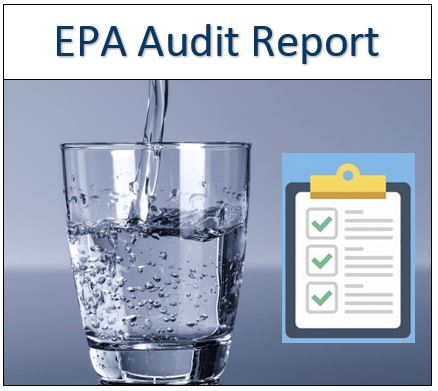Latest Publications
Waste Battery Management Report Template 2025
Year: 2025
This template is be used by self-complying battery producers to prepare their annual waste battery management report in compliance with the European Union (Batteries and Accumulators) Regulations 2014 (S.I. No. 283 of 2014). It is a macro-enabled template and should be completed by validly registered self-complying battery producers.

Navan Mid Meath Kilcarn Audit 10/10/2025
Year: 2025
Report of an audit carried out at Navan Mid Meath (Kilcarn) public drinking water supply, Co. Meath on 10/10/2025

An Fheothanach Audit 22/10/2025
Year: 2025
Report of an audit carried out at An Fheothanach public drinking water supply, Co. Kerry on 22/10/2025

An Baile Mór Audit 22/10/2025
Year: 2025
Report of an audit carried out at An Baile Mór public drinking water supply, Co. Kerry on 22/10/2025

Kingscourt PWS Audit 07/10/2025
Year: 2025
Report of an audit carried out at Kingscourt public drinking water supply, Co. Cavan on 07/10/2025

Cootehill PWS Audit 08/10/2025
Year: 2025
Report of an audit carried out at Cootehill public drinking water supply, Co. Cavan on 08/10/2025
Cigire/Oifigeach Eolaíochta II (Leibhéal 4) Ginearálta
Uimhir phoist: 000539, December 2025
Year: 2025
Comhlíonfaidh na hiarrthóirí rathúla ról an Chigire/Oifigigh Eolaíochta II (Leibhéal 4) Ginearálta. Cruthóidh an EPA painéal ón bhfeachtas earcaíochta seo as a bhféadfar folúntais Chigire/Oifigigh Eolaíochta II (Leibhéal 4) amach anseo a líonadh. Líonfar folúntais láithreacha i gCeanncheathrú an EPA, Loch Garman, agus i gCigireachtaí Réigiúnacha an EPA i mBaile Átha Cliath. Féadfaidh na sannadh agus an réimse oibre athrú ina dhiaidh sin de réir riachtanais eagraíochtúla.
Cigire/Oifigeach Eolaíochta III (Leibhéal 5) Ginearálta
Uimhir phoist: 000540, December 2025
Year: 2025
Tá an EPA ag earcú chun ról Cigire/Oifigeach Eolaíochta III (Leibhéal 5) Ginearálta a chomhlíonadh. Sannfar ról teicniúil don cheapaí a thuairiscíonn do bhainisteoir líne laistigh dá bhfoireann sannta. Oibreoidh na hiarrthóirí rathúla mar chuid d'fhoireann ildisciplíneach ghairmiúil agus foghlaimeoidh siad conas beartais an EPA a fhorbairt agus a chur i bhfeidhm i ndáil le feidhmeanna an réimse oibre a bhfuil siad sannta dó. Tá an EPA tiomanta don fhoghlaim agus don fhorbairt agus tá sraith tacaíochtaí ar fáil a chabhróidh leis na hiarrthóirí rathúla lena bhforbairt ghairmiúil.
Inspector / Scientific Officer II (Level 4) General
Post Number: 000539, December 2025
Year: 2025
The successful candidates will fulfil the role of Inspector/Scientific Officer II (Level 4) General. The EPA will form a panel from this recruitment campaign from which future Inspector/Scientific Officer II (Level 4) vacancies may be filled. Immediate vacancies will be filled in EPA Headquarters, Wexford, and EPA Regional Inspectorates in Dublin. The assignments and area of work may subsequently change in accordance with organisational requirements.
Inspector/Scientific Officer III (Level 5) General
Post Number: 000540, December 2025
Year: 2025
The EPA is recruiting to fulfil the role of Inspector/Scientific Officer III (Level 5) General. The appointee will be assigned a technical role reporting to a line manager within their assigned team. Successful Candidates will work as part of a professional multi-disciplinary team and will learn how to develop and implement EPA policies in relation to the functions of the work area to which they are assigned. The EPA has a commitment to learning and development and has a suite of supports available which will assist the successful candidates with their professional development.
See Something Say Something (Irish Version)
How to make an environmental complaint, December 2025
Year: 2025
This leaflet explains who you should contact and what you can do to help resolve environmental problems
See Something Say Something (English Version)
How to make an environmental complaint, December 2025
Year: 2025
This leaflet explains who you should contact and what you can do to help resolve environmental problems
Radioactivity in Seawater 1995 to 2024
Year: 2025
Radioactivity in Marine Biota 1995 to 2024
Year: 2025
SI Derrymore Bog Co Longford 14th August 2025
Year: 2025
SI Derrymore Bog Co Longford 14th August 2025
